Young Conservatives Tired of Climate Denial
Air Date: Week of October 6, 2023
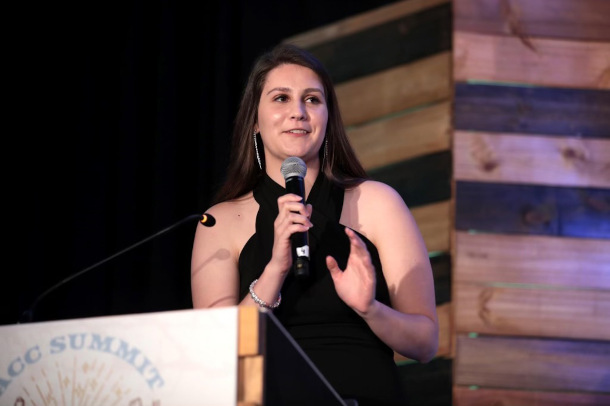
Karly Matthews is Vice President of Communications for the American Conservation Coalition, an organization whose mission is to build the conservative environmental movement. (Photo: American Conservation Coalition)
As the 2024 campaign season heats up, some young Republicans want their party to move on from climate denial and offer solutions. Karly Matthews is Vice President of the American Conservation Coalition and joins Host Jenni Doering to discuss policies that align with the environmental roots of the party.
Transcript
O’NEILL: From PRX and the Jennifer and Ted Stanley Studios at the University of Massachusetts, Boston this is Living on Earth. I’m Aynsley O’Neill.
DOERING: And I’m Jenni Doering.
The Republican party has seen its fair share of environmental leaders throughout American history. President “Teddy” Roosevelt created the U.S. Forest Service and doubled the number of sites in the national park system and President Nixon signed both the Clean Air Act and the Endangered Species Act. But things took a turn when the powerful fossil fuel lobby put an enormous amount of pressure on politicians, especially on the right. So many Republican politicians started to downplay or outright deny the science of climate change, like former President Donald Trump who dismissed it as a “hoax.” But as the 2024 campaign season heats up, some young Republicans want their party to move on from this denial. Karly Matthews, Vice President of the American Conservation Coalition, says it’s about getting back to the environmental roots of the party.
MATTHEWS: A lot of people in 2023 polarized politics don't think that conservative and conservation are really compatible. But when you look back in US history, Republican presidents were really instrumental in a lot of environmental protection, legislation and initiatives. At the end of the day, we want to conserve what is good about our country. And at ACC, we see our natural environment as being a huge part of that. We see environmental stewardship as being very compatible with the idea of conserving the land, of leaving the earth better for future generations. And we see a lot of kind of traditionally conservative demographics like farmers, ranchers, outdoorsman, hunters, fishers, all of those people have this kind of conservation ethos, and have been kind of alienated by an environmental movement that might focus more on preservation or regulations or top down solutions. And we see a really big opportunity to show those demographics that you can be an environmentalist and be a hunter or be a farmer. So what we really see our role is to build and kind of reignite that conservation ethos within the conservative movement.
DOERING: And what about traditional energy workers?
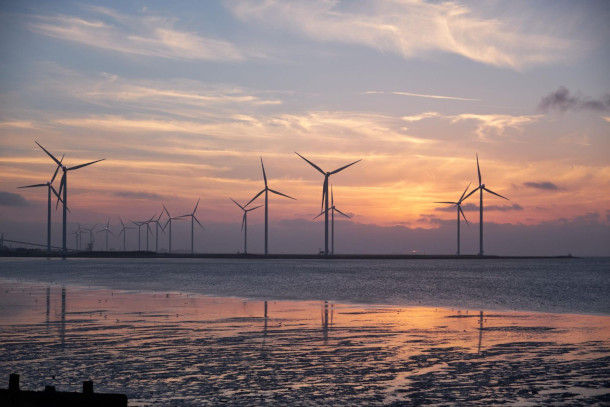
It often takes years to get clean energy projects on the grid. ACC says permitting reform could speed up that process. (Photo: Pixabay, Pexels)
MATTHEWS: Absolutely, I think this is a great question. And it's something we really have to reckon with if we want to have a clean energy transition. And to be clear, ACC supports clean energy, we want to see more clean energy on the grid. But at the same time, messaging like, we're going to shut down all coal plants tomorrow, is not only not feasible for our energy demands, but also, that's leaving a lot of folks behind. And it's not a sustainable way to transition to a clean future. So we see, you know, workforce development as a really important part of the clean energy transition. I think 70 some percent of skills that someone uses in a coal plant can be transferred to a nuclear power plant. That's really encouraging, right? So I think it's just really important when you're messaging with traditional energy workers that a clean energy transition is not necessarily taking something away from them, and it can really be an opportunity.
DOERING: Now, the Intergovernmental Panel on Climate Change, or IPCC, is calling for a rapid reduction in carbon emissions, 50% by the end of this decade, in order to avert climate disaster. So what kinds of climate policies can move quickly while also aligning with conservative values?
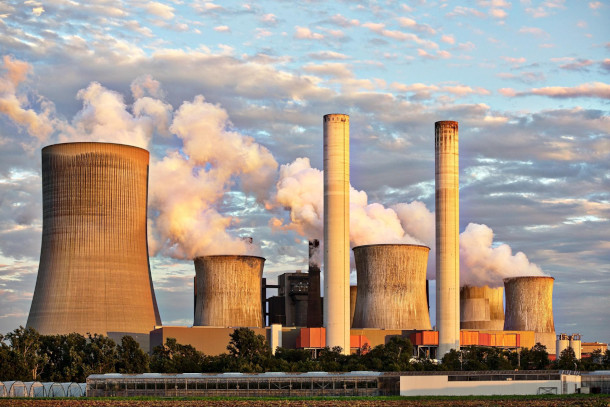
Many conservative environmentalists say the government should incentivize clean nuclear energy. (Photo: Pixabay, Pexels)
MATTHEWS: Yeah, the first thing that comes to mind here is permitting reform. And this idea that, you know, the United States is requiring energy companies to spend millions of dollars and years of time to get energy projects online is frankly absurd. We built the Empire State Building in a year. And it takes, you know, decades to get an offshore wind farm online. We can still have very high environmental standards, but speed up these processes. So making sure that our federal offices are staffed properly, and can actually respond to all these requests, making sure that there's kind of a rapid avenue for advocacy groups or citizens to be heard in these processes. So when we're talking about needing to rapidly reduced emissions, cutting that red tape is so so important. The other way here is incentives. And we see this a lot with you know, tax credits, or voluntary conservation programs. I think we definitely need to be incentivizing things like nuclear energy. But we really see that kind of idea of like a carrot rather than a stick. And there's really evidence for this, right, because the Waxman-Markey Bill was really kind of the talk of climate action during the Obama years. It never became law. But actually, we exceeded emissions reductions that were estimated in that bill without even passing it because the private sector took incentives from the federal government, to be sure, but really stepped up and decided, you know, we need to reduce emissions. But we really see the government stepping in and frankly, making it easier for companies, nonprofits, regular citizens, to take action on these issues, rather than kind of putting barriers up in their way. So I think when we're talking about speed, it's also natural climate solutions, you know, ecosystem restoration, regenerative agriculture, active forest management, those are things we can be doing right now.
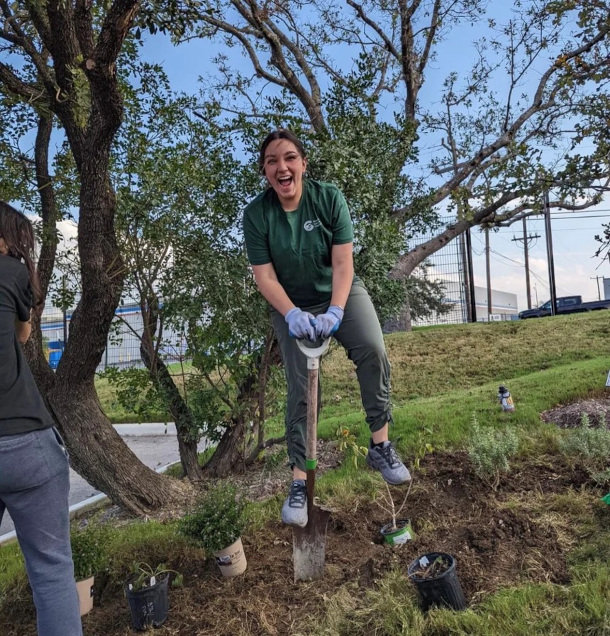
The ACC supports local, grassroots ecological restoration. (Photo: American Conservation Coalition)
DOERING: And by forest management, you mean like going in and doing regular thinning of trees, so doing some logging selectively to keep down that excess fuel?
MATTHEWS: Absolutely, yeah. And especially when it comes to forest management, there's a lot of pushback from a lot of traditional environmental groups on this. But if we continue to kind of take this preservation approach to managing our forests, we're going to continue to have these out of control wildfires, that of course, sometimes are human ignited or exacerbated by climate change. But at the end of the day, if a forest is poorly managed, it's going to ignite faster and it's going to spread rapidly. So really making sure that we're doing everything that we can to reduce unnecessary emissions like that.
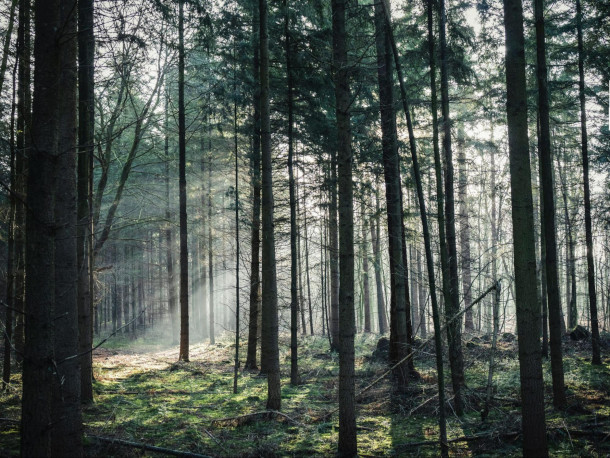
Advocates of forest management say the practice may prevent wildfires by removing excess fuel. (Photo: Lukas Hartmann, Pexels)
DOERING: So Karly, in the first presidential debate, one of the Republican presidential candidates, Vivek Ramaswamy, called the climate change agenda a "hoax," which was met with boos from the audience. And that's something former President Trump has repeated over and over again as well. How well or poorly do you think denying the science of climate change is actually playing with conservative voters these days?
MATTHEWS: Well, I can say with the utmost confidence, it does not play with the conservative audience. ACC was very firm in saying that, you know, climate change and hoax should not be used in the same sentence. I think, frankly, the American people want to hear how presidential candidates are going to make their communities healthier, are going to make their lives better. They don't want to hear politicians debating climate science, right? They want solutions.
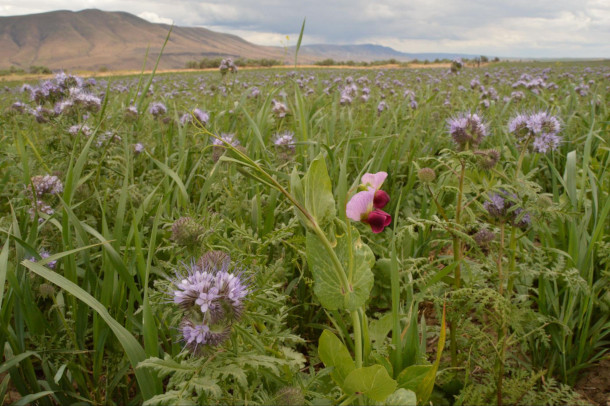
Regenerative agriculture practices like planting cover crops can restore soil health and sequester carbon and are attracting bipartisan support. (Photo: Garrett Duyck, NRCS Oregon, Flickr, CC BY-ND 2.0)
DOERING: In late 2022, Pew Research Center found that 73% of Republicans ages 18 to 39 think that climate change is a serious problem. From your experience, what are especially young Republicans expecting from these presidential candidates running in 2024?
MATTHEWS: I think what young conservatives want from a presidential candidate is, frankly, to acknowledge that climate change is happening and pivot to solutions that are going to bolster the economy, but also protect our environment. And I think that a lot of times, that second part is actually there in a lot of messaging, but it's not clearly tied back to, yes, climate change is happening. So I think, for young Republicans to really kind of throw their support behind a candidate, if climate is one of their top priorities, which I believe it is with young conservatives, is to just hear that, that candidate will acknowledge climate change is happening, human activity, the industrial revolution has played a role, and we need to do something about it. And here's my plan.
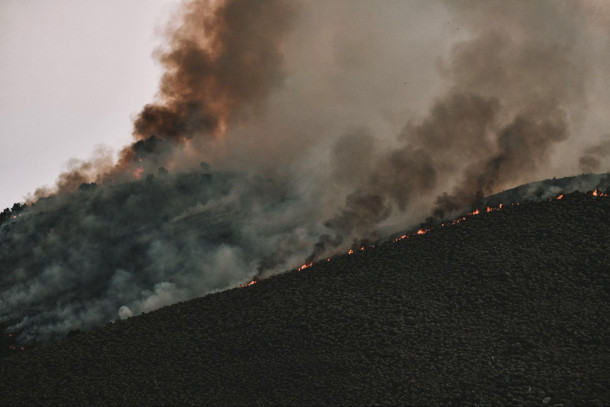
In late 2022, Pew Research Center found that 73% of Republicans aged 18-39 believe that global climate change is a “very serious” or “somewhat serious” problem. (Photo: Tim Mossholder, Pexels)
DOERING: And to what extent have you heard any of that from any of the candidates so far?
MATTHEWS: Well, I think that former ambassador Nikki Haley's response to Vivek on the debate stage in Milwaukee was very encouraging, saying, yes, climate change is happening. The way that we solve it is through American leadership. Obviously, we need some more details. But I think her flat out saying yes, climate change is real, and we have to do something about it played very well. And actually, we were looking at some real time dial testing after the debate. And when Vivek said, you know, the climate agenda is the hoax, support with women and young people just absolutely tanked. And the complete opposite was true when Ambassador Haley said climate change is happening. So I think there's ample evidence that just acknowledging climate is so so important.
DOERING: So in the second Republican debate, candidates called for American energy independence centered on traditional sources, like oil and gas, but offered little in the way of doing anything to avert the climate crisis. What would you like to hear from these candidates moving forward?
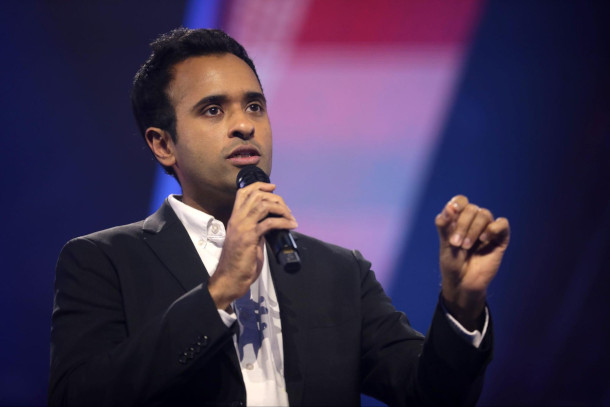
In the first Republican presidential debate, Vivek Ramaswamy was met with “boos” from the audience when he said, “The climate change agenda is a hoax.” (Photo: Gage Skidmore, Flickr, CC BY-SA 2.0)
MATTHEWS: Absolutely. So I think obviously, climate was not a big focus on the debate stage. There were some questions about energy, to your point, they did focus largely on traditional energy. I will say, to his credit, since we've kind of slammed on him a little bit, Vivek did say that he supports clean nuclear energy. So I'll give him a shout out there. But I really do think, you know, talking about domestic energy production is a part of a climate strategy. But again, we need to tie that back to climate change is happening. This is why we need cleaner American energy. So I really just think there's that bridge kind of missing so far. But there were some encouraging things said on the debate stage. I think former Vice President Pence talked about an all of the above energy strategy. But to your point, I think there just needs to be kind of some more expansion and some more connection back to climate when we're talking about energy.
DOERING: What's one question you would ask candidates if you had the chance?
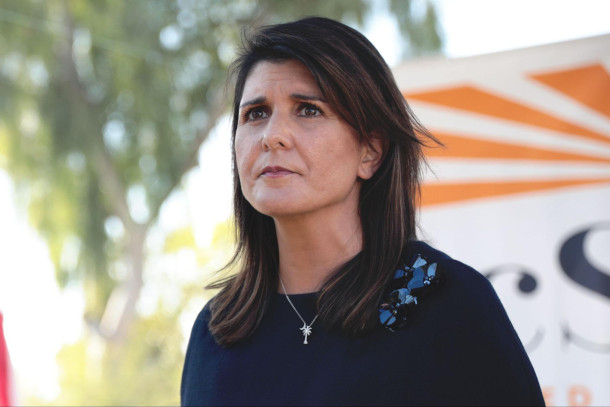
In contrast to Ramaswamy, former United Nations Ambassador Nikki Haley said climate change is real. (Photo: Gage Skidmore, Flickr, CC BY-SA 2.0)
MATTHEWS: I think my question on climate would just be, how are you going to ensure that all Americans have clean air, clean water, and safe environments to live in? Because I think that we've seen over and over again, recently, Americans denied those rights, and how are we going to deal with these environmental challenges that directly affect people's lives? East Palestine, Ohio comes to mind. After that train derailment, frankly, there wasn't enough kind of action and reassurance from any government entity that, you know, these issues would be resolved and the community would again have clean air and clean water. Flint, Michigan, too, and Jackson, Mississippi. There are just so many instances, right? We can't even list them all. So I think it's just really important that candidates prioritize kind of environmental protection even at the local level.
DOERING: Karly Matthews is Vice President of Communications for the American Conservation Coalition. Thank you so much, Karly.
MATTHEWS: Thanks for having me.
Links
American Conservation Coalition
Watch the first Republican debate
Living on Earth wants to hear from you!
Living on Earth
62 Calef Highway, Suite 212
Lee, NH 03861
Telephone: 617-287-4121
E-mail: comments@loe.org
Newsletter [Click here]
Donate to Living on Earth!
Living on Earth is an independent media program and relies entirely on contributions from listeners and institutions supporting public service. Please donate now to preserve an independent environmental voice.
NewsletterLiving on Earth offers a weekly delivery of the show's rundown to your mailbox. Sign up for our newsletter today!
 Sailors For The Sea: Be the change you want to sea.
Sailors For The Sea: Be the change you want to sea.
 The Grantham Foundation for the Protection of the Environment: Committed to protecting and improving the health of the global environment.
The Grantham Foundation for the Protection of the Environment: Committed to protecting and improving the health of the global environment.
 Contribute to Living on Earth and receive, as our gift to you, an archival print of one of Mark Seth Lender's extraordinary wildlife photographs. Follow the link to see Mark's current collection of photographs.
Contribute to Living on Earth and receive, as our gift to you, an archival print of one of Mark Seth Lender's extraordinary wildlife photographs. Follow the link to see Mark's current collection of photographs.
 Buy a signed copy of Mark Seth Lender's book Smeagull the Seagull & support Living on Earth
Buy a signed copy of Mark Seth Lender's book Smeagull the Seagull & support Living on Earth

